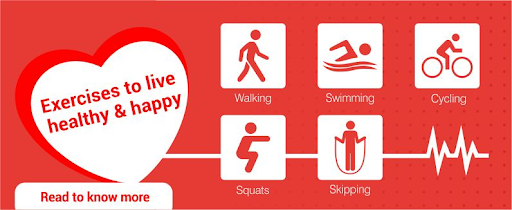A healthy heart is essential for overall well-being, and one of the best ways to maintain it is through regular exercise. The heart is a muscle that needs to be worked out just like any other muscle in the body. Engaging in physical activities helps improve cardiovascular health, reduce the risk of heart disease, and promote a healthier lifestyle. This blog will explore the importance of regular exercise for heart health, the types of exercises that benefit the heart, and practical tips for incorporating exercise into your daily routine.
Why is Exercise Important for Heart Health?
Exercise plays a vital role in keeping the heart strong and efficient. Here are some key reasons why regular physical activity is crucial for heart health:
Improves Cardiovascular Efficiency: Exercise helps the heart pump more efficiently, increasing blood flow and oxygen supply to the body's tissues. This efficiency reduces the workload on the heart.
Reduces Blood Pressure: Regular physical activity helps to lower blood pressure by keeping blood vessels flexible and promoting good circulation, reducing the strain on the heart.
Lowers Cholesterol Levels: Exercise can help reduce bad cholesterol (LDL) levels and increase good cholesterol (HDL), reducing the risk of plaque buildup in the arteries.
Helps Maintain a Healthy Weight: Being overweight is a significant risk factor for heart disease. Exercise helps burn calories, promote weight loss, and prevent obesity, thereby reducing the risk of heart-related issues.
Reduces Stress and Anxiety: Physical activity stimulates the production of endorphins, known as the brain's feel-good neurotransmitters. Reducing stress and anxiety can prevent heart disease and promote overall mental well-being.
Improves Blood Sugar Control: Exercise helps regulate blood sugar levels, which is essential for preventing diabetes—a major risk factor for heart disease.
Types of Exercises Beneficial for Heart Health
Not all exercises are created equal, but several types can specifically benefit heart health:
Aerobic Exercises: Activities like walking, jogging, swimming, and cycling increase the heart rate and improve the heart’s ability to pump blood. Aim for at least 150 minutes of moderate-intensity aerobic exercise per week.
Strength Training: Lifting weights and resistance training help build muscle mass and reduce fat. Muscle mass helps burn more calories even at rest, aiding weight management and heart health.
Flexibility and Balance Exercises: Activities like yoga and stretching improve flexibility, which can help prevent injuries and stress. Yoga also promotes relaxation, which can lower stress levels and blood pressure.
High-Intensity Interval Training (HIIT): HIIT involves short bursts of intense activity followed by rest periods. This type of exercise can improve cardiovascular health and burn more calories in less time.
Tips for Incorporating Exercise into Your Routine
Incorporating regular exercise into your routine doesn't have to be daunting. Here are some practical tips:
Start Slowly: If you're new to exercise, start slowly with activities like walking or light jogging. Gradually increase the intensity and duration as your fitness level improves.
Set Realistic Goals: Set achievable goals to keep yourself motivated. Whether it's a daily 30-minute walk or a 5K run, having a target can help maintain consistency.
Find Activities You Enjoy: Exercise doesn’t have to be boring. Find activities you enjoy, whether it's dancing, swimming, hiking, or playing a sport. Enjoyable activities increase the likelihood of sticking to your exercise routine.
Make it Social: Exercise with friends, and family, or join a fitness class. Exercising with others can be motivating and make workouts more fun.
Incorporate Movement into Daily Life: Look for ways to add more movement to your daily routine. Take the stairs instead of the elevator, walk or bike to work, or take short breaks to stretch and walk around if you have a desk job.
Use Technology: Fitness trackers and apps can help monitor your progress and keep you motivated. Set reminders to get up and move throughout the day.
Consistency is Key: Make exercise a habit by sticking to a schedule. Consistency is crucial for long-term heart health benefits.
Listen to Your Body: Pay attention to how your body feels during and after exercise. It’s essential to push yourself but not to the point of pain or discomfort. Rest when needed and consult a healthcare provider if you have any health concerns.
Conclusion
Regular exercise is a powerful tool for maintaining a healthy heart. By understanding the importance of physical activity and finding enjoyable ways to stay active, you can significantly reduce the risk of heart disease and enhance your overall quality of life. Remember, the journey to a healthier heart starts with a single step. Prioritize regular exercise, and you'll be on your way to a stronger, healthier heart.
Additional Resources
- American Heart Association: Heart Health Tips
- Centers for Disease Control and Prevention: Physical Activity Guidelines
- National Heart, Lung, and Blood Institute: Healthy Heart Tips


